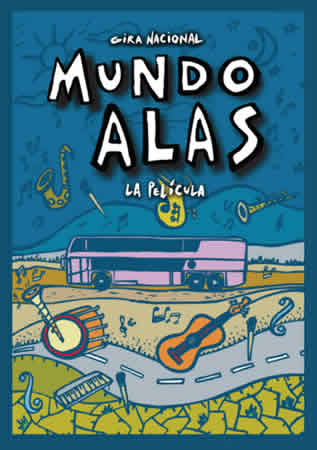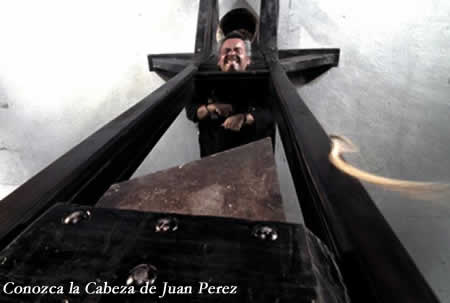 Laemmle Theatres and Outsider Films present the Latin American Showcase. The four films will each screen once a day, beginning August 13 at Laemmle Sunset 5. “Mundo Alas” will screen twice a day. The evening screening will be followed by a half-hour performance by Argentine Folk-Rock legend León Geico.
Laemmle Theatres and Outsider Films present the Latin American Showcase. The four films will each screen once a day, beginning August 13 at Laemmle Sunset 5. “Mundo Alas” will screen twice a day. The evening screening will be followed by a half-hour performance by Argentine Folk-Rock legend León Geico.
León Gieco, often called the Bob Dylan of Argentina, created a touring ensemble of physically and developmentally challenged musicians, dancers, singers and painters for a tour across Argentina.
Over the years Gieco often invited disabled musicians that he met on the road, onstage to perform with him. From that habit, developed the idea for a full-fledged tour, all to be filmed by Gieco and co-directors Fernando Molnar and Sebastián Schindel.
The filmmakers follow the artists, chronicling parts of their life stories and hearing about their dreams. We watch rehearsals, performances, the vagaries of hotel life, a recording session for the Mundo Alas soundtrack and the culminating concert at Buenos Aires prestigious Luna Park. Relationships develop, two tango dancers strike up a romance, and the reality of making art with disability emerges.
Sensitive Geico shepherds the artists on the road, mentoring with a light touch. Blind folksinger Carina Spina performs some exquisite duets with Gieco. Singer, mouth harpist Francisco “Pancho” Chévez, born without extremities, has been playing roadhouses for years. Alejandro Davio, who suffers from congenital hydrocephalus, is gifted blues guitarist.
Songwriter Gieco received a Latin Grammy Lifetime Achievement Award in 2006.
Mexican director Emiio Portes’s “Conozca la cabeza de Juan Pérez“, which premiered at the Guadalajara Film Fest is a high-energy black comedy. Circus manager, escape artist Juan (Silveria Palacios) hopes to rescue his small-time circus by stealing steal a 16th-century guillotine from a museum. Alas, the artifact is cursed, as some guignol animated sequences illustrate.
Copping shtick from Sunset Boulevard, the very dead, in fact decapitated, Juan narrates the story of how that came to pass. A complex series of feuds from various offbeat circus performers who’ve been laid off complicates the plot. Jose Sefami plays the vindictive clown Gorgo with brio. The clown-turned museum guard is hot for Perez’s limping wife Lucia (Dolores Heredia-Best Mexican Debut/Best Actress, Guadelejara). Vizconde Morge Maledeti (Rubén Cristiany), the guillotine’s owner, is a character straight out of a Vincent price horror movie. Isela Vega plays the old fortuneteller. Slapstick and horror film clichés, a strong visual style and a fevered score by Aldo Max Rodriguez are some of the plusses.
The plot is overwritten, but many giddy scenes emerge including a card game, in which the suspicious players strip to prevent cheating. There’s a dreadful kid’s party set piece, a silly poodle act (who wouldn’t want that?) and enough inventiveness to burn.
Colombian first-time director Oscar Ruiz Navia’s “Crab Trap“, set in an isolated black community on Colombia’s undeveloped northern Pacific coast, turns a narrative with a doc feel into an encounter between the vanishing rural culture and the modern world. Daniel (Rodrigo Vélez) walks into the jungle village of La Barra, looking for a motorboat to leave the country. All the boats are in use. Daniel’s only chance is to rent a boat whenever the fishermen return from their distant and increasingly fruitless fishing. Daniel hunkers down in a hammock, hosted by the community leader Cerebro (Arnobio Salazar Rivas), whose sworn to protect the traditional village from the ill considered ‘ development schemes of Paisa (Jaime Andres Castano). Big city interloper Paisa, who’s planning a resort and bar, has fenced off the community owned beach and blares loud music all day and night, hoping to force his neighbors to move off the tiny strip of beach. Paisa has a deed to his land, but the villagers have been living there for generations.
Lucia, a savvy little girl and owner of the crab trap, inveigles Daniel to visit her mother so he can buy lunch from her and bring some money into their impoverished household. Vélez plays the silent Daniel with a light touch. Karent Hinestroza plays Jazmin, the local beauty that Paisa’ s been courting. Navia build up his atmosphere with a languid wash of details. Sparse dialogue, meditative compositions and lingering shots give the village a mythic quality.
Nava developed the film over four years, working with locals to capture their issues. As in Pedro González-Rubio’s “Alamar”, a cast of non-professional actors helps create a tone poem that hints at global issues while staying true to its sense of place.
Hernan A. Goldfrid’s “Music on Hold” (Musica en espera), a charming romantic comedy, uses an answering machine “ringtone” as its McGuffin. Film Composer Ezequiel (Diego Peretti-“La señal “) has landed an important commission but he’s completely blocked. His ex-wife is giving him grief, and he has twenty days to pay off the mortgage on his house. Trying to reach his bank manager, he’s bounced form extension to extension. Bank exec Paula (Natalia Oreiro) puts him on hold and he discovers an inspiring piece of musak that seems to be the solution to his film score. He visits the bank trying to locate the magic piece of musak. Two hapless security men tag him as suspicious character. Ezequiel uses Paula’s name to get access to the office floor, where he wanders around listening to phones, looking for his magic music.
Paula’s pregnant and unmarried. She’s been lying to her parents in Madrid about a traveling boyfriend. Mom (Norma Aleandro) shows up in Buenes Aires unannounced to help her prepare for the birth. When security officers chase Ezequiel into Paula’s office, she introduces him to mom as her baby-daddy Santiago. While Paula engineers a way for him to check all the banks extensions he plays prospective father. A smart ensemble piece with great performances and clever moments makes this an accomplished rom-com. Expert comedienne Norma Aleandro details every moment. The film ends with a sequence of the noirish film, scored by Ezequiel. Daniel Burman and Diego Dubcovsky (Derecho de familia) produced. Guillermo Guareschi’s classical- inflected music pushes the film along.

